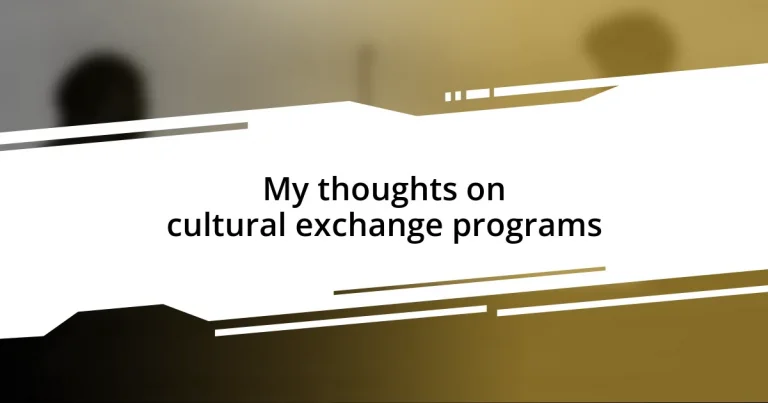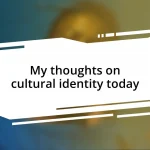Key takeaways:
- Cultural exchange programs promote mutual understanding and respect through immersive experiences, fostering lasting friendships and personal growth.
- Participants often face challenges like culture shock and language barriers but overcoming these leads to significant personal revelations and deeper connections.
- Preparation is crucial; researching the host culture, maintaining open communication, and setting clear expectations enhance the exchange experience.
- The future of cultural exchanges may include virtual programs, a focus on sustainability, and increased collaboration between institutions for enriched global experiences.
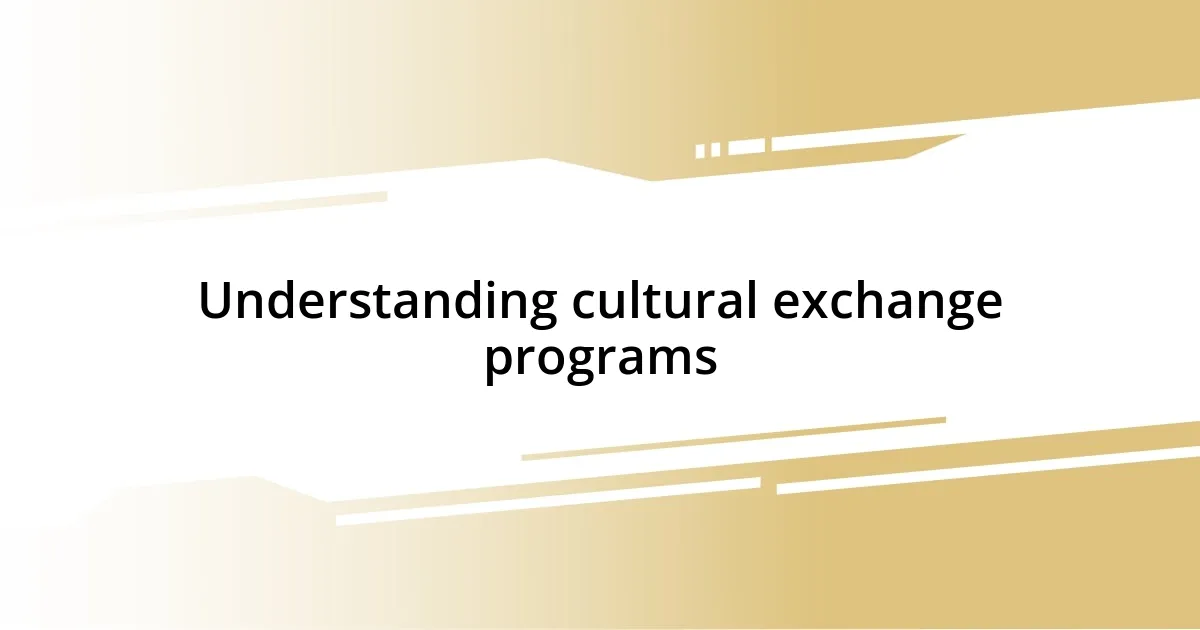
Understanding cultural exchange programs
Cultural exchange programs are unique opportunities that immerse participants in different ways of life. I remember my own experience in a program where I stayed with a family in France; the warmth and hospitality they showed transformed my understanding of connection. Have you ever felt that moment when a simple meal shared with strangers suddenly turns into a treasured memory?
These programs serve as bridges between cultures, fostering mutual understanding and respect. I’ve seen firsthand how simple interactions, like trying to pronounce a new word in a foreign language, can break down barriers and spark laughter, creating bonds that last a lifetime. Isn’t it fascinating how a shared experience can lead to profound insights about ourselves and others?
At their core, cultural exchange programs encourage participants to step outside their comfort zones. I still recall feeling a mix of excitement and uncertainty before embarking on mine, but that leap of faith opened my eyes to a world filled with diversity and richness. What’s stopping you from exploring new cultures and discovering parts of yourself you never knew existed?
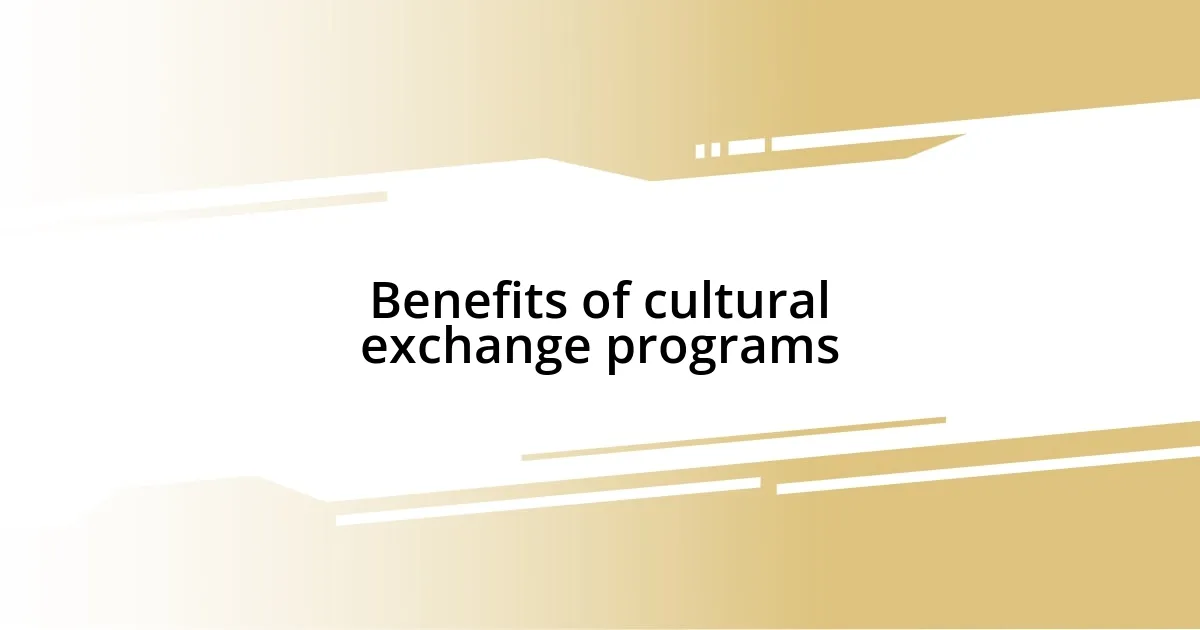
Benefits of cultural exchange programs
Participating in cultural exchange programs can significantly broaden one’s perspective. I remember the first time I tried cooking a traditional dish from Thailand. The flavors and techniques were so different from anything I had ever experienced. It wasn’t just about the food; it was a deeper understanding of the culture behind it. Each culinary adventure in a different country can be a gateway to meaningful insights about their daily life and practices.
Additionally, these programs boost communication skills in a way that textbooks simply cannot replicate. I’ve often found myself in situations where I had to navigate through language barriers, but it taught me to be more adaptable and creative with my communication. This hands-on experience has improved my ability to convey thoughts and emotions more effectively, proving that often the best lessons come from real-life interactions rather than formal education.
Finally, cultural exchange fosters lasting friendships that span the globe. After I returned from my exchange, I still keep in touch with several friends I met during that time. The bonds we formed over shared experiences created a network of support that has enriched my life in so many ways. Isn’t it incredible how a single journey can lead to friendships that feel timeless, no matter the distance?
| Benefits | Examples |
|---|---|
| Broadened Perspectives | Cooking traditional dishes from various cultures |
| Improved Communication Skills | Navigating language barriers in real situations |
| Lasting Friendships | Ongoing connections with exchange partners |
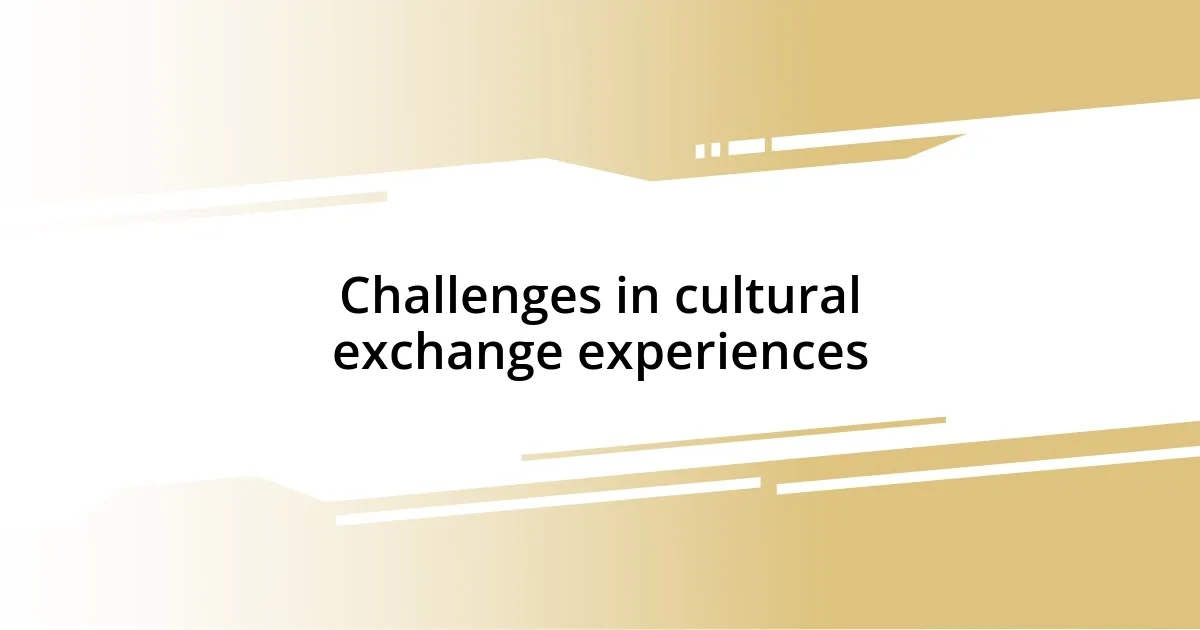
Challenges in cultural exchange experiences
Cultural exchange experiences, while enriching, often come with their own set of challenges. When I participated in a program in Japan, I faced culture shock that hit me like a wave at first. I vividly remember feeling overwhelmed by new customs and social norms, which made me question my place in that environment. These moments can be disheartening but ultimately contribute to personal growth.
The challenges often stem from various factors, including:
- Language Barriers: Misunderstandings can lead to frustration, as I found when trying to navigate a conversation during my first week abroad.
- Cultural Differences: Different social etiquette can sometimes create awkward situations. I learned the hard way about proper dining manners in a formal setting.
- Homesickness: Despite being excited, I felt pangs of loneliness that made me long for familiar comforts.
- Adaptation Stress: Adjusting to daily life in a different culture can be exhausting. I often felt mentally drained by the end of the day.
Even with these hurdles, I’ve discovered that pushing through these challenges often leads to some of the greatest personal revelations. What initially felt daunting often became a stepping stone to deeper connections and understanding.
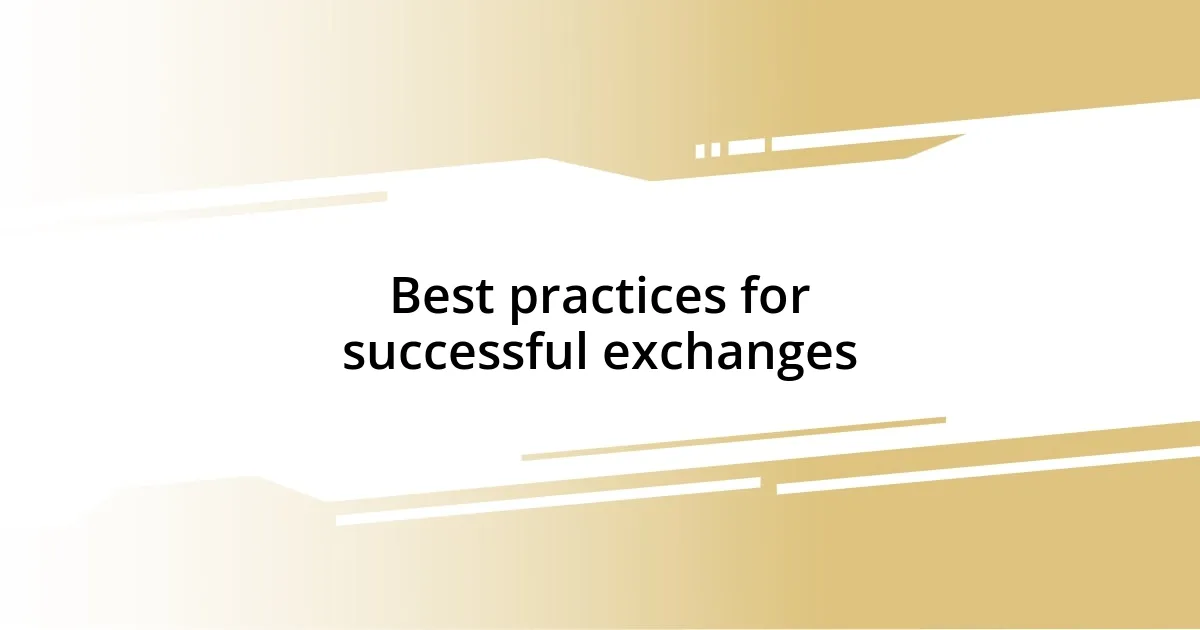
Best practices for successful exchanges
When preparing for a cultural exchange, thorough research about the host country is key. I remember diving into the customs and history of Italy before my exchange; it made my experience feel more authentic. Understanding local traditions not only eased my integration but also sparked fascinating conversations on topics I studied.
Open communication is another cornerstone of successful exchanges. I found that sharing my feelings—be it excitement or anxiety—helped build a supportive environment with my host family. Have you ever spent time with someone and felt an instant connection? That’s the bond that grows when you’re honest about your journey.
Lastly, setting clear expectations is vital. During my exchange in Brazil, I laid out what I hoped to gain and what I was willing to share. This transparency created a mutual understanding that enriched my experience. It reinforced the idea that a successful exchange thrives on respect for both cultures, leading to a more rewarding adventure.
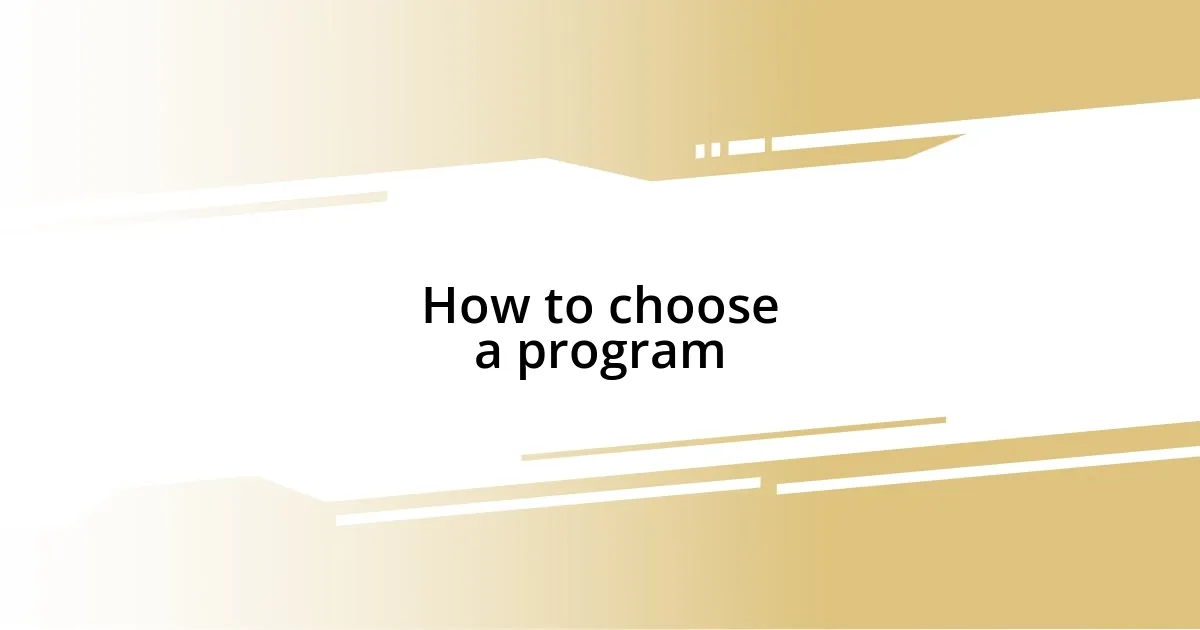
How to choose a program
Choosing the right cultural exchange program can greatly affect your experience, so take your time to explore your options. I remember when I was deciding on my program; I made a list of my priorities, such as language immersion, duration, and type of host family. It’s amazing how much clarity a simple checklist can provide when you’re overwhelmed by choices!
Another significant factor is the program’s support system. During my exchange in South Korea, having access to mentors and local coordinators made a world of difference. I often think back to how they helped me navigate tricky situations, whether it was finding my way around the city or understanding cultural politeness. Isn’t it comforting to know that support is just a phone call away in a foreign environment?
Lastly, consider the cultural elements that excite you the most. I was drawn to Japan’s rich history and art scene, which fueled my enthusiasm throughout my stay. What sparks your curiosity? Tailoring your program to include aspects you are passionate about is essential; it makes the experience not just educational but deeply personal and fulfilling.
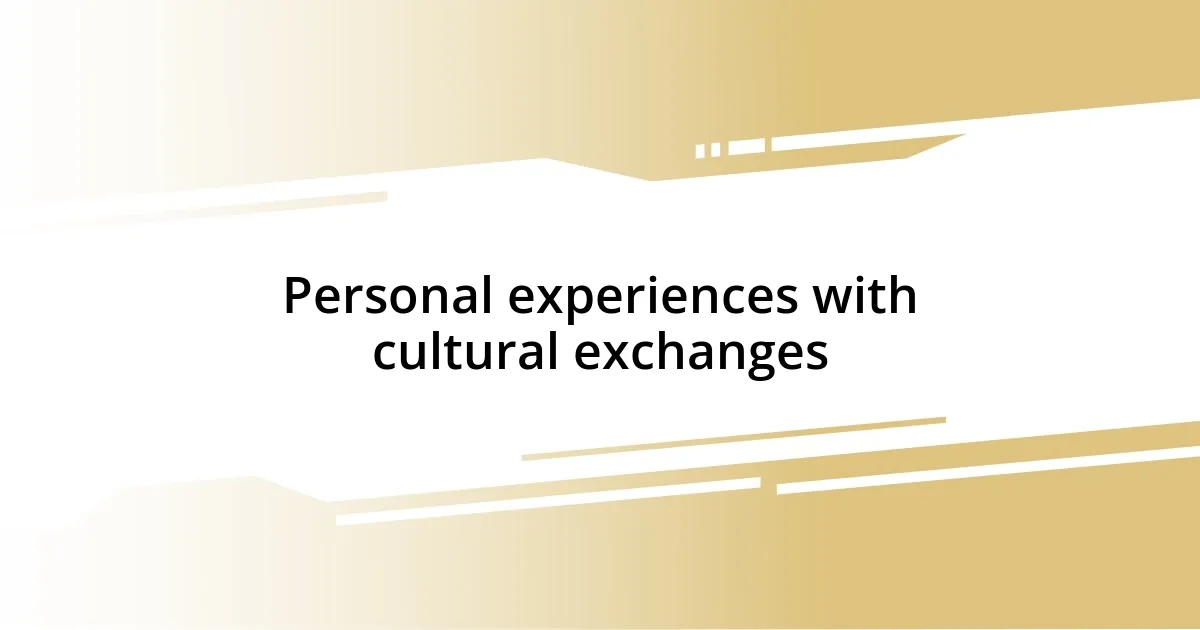
Personal experiences with cultural exchanges
Participating in a cultural exchange in Spain was a turning point for me. I remember stepping into my host family’s home and immediately feeling the warmth of their hospitality. They invited me to join in family meals that often lasted hours, filled with laughter and stories. Have you ever realized how food can bring people together in such a profound way? Sharing meals with them helped me to appreciate not just their cuisine but their values and way of life.
One moment that stands out vividly for me was during a local festival. I had the chance to wear traditional clothing and dance alongside my new friends. It was a bit daunting at first, but their encouragement made me feel integrated and accepted. This experience really underlined the importance of stepping out of your comfort zone. Have you ever felt nervous about trying something new, only to find it brought you closer to those around you?
Finally, the friendships I forged during my time abroad have had a lasting impact. I remember sitting up late at night with friends from different countries, sharing our dreams and aspirations. Those heartfelt conversations opened my eyes to perspectives I had never considered before. Isn’t it amazing how cultural exchange can broaden your worldview and reinforce the idea that, despite our differences, we all seek connection and understanding?
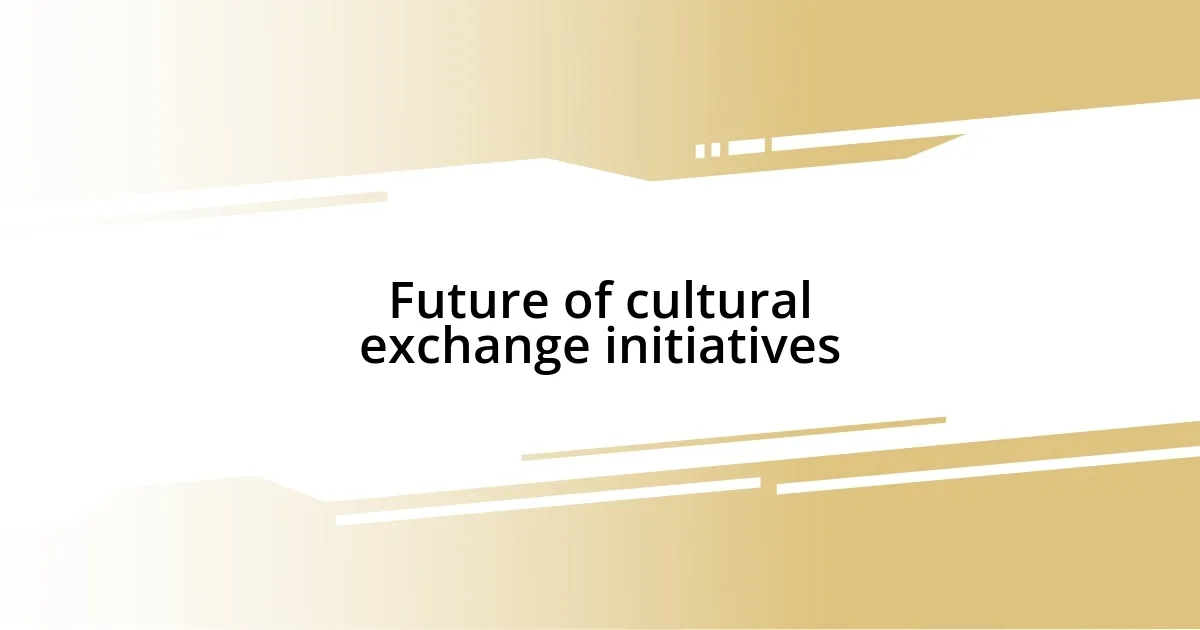
Future of cultural exchange initiatives
The future of cultural exchange initiatives seems poised for exciting transformations. I believe we’ll see a surge in virtual exchanges, allowing participants to connect across the globe without the traditional barriers of travel costs or logistics. I remember joining a virtual language exchange during the pandemic; it felt surreal to have meaningful conversations with someone halfway across the world from the comfort of my living room. Isn’t it fascinating how technology can shrink distances and create new friendships?
Moreover, cultural exchange programs will likely focus more on sustainability and social responsibility. I’ve noticed many organizations are now emphasizing eco-friendly practices and community engagement. During one initiative I participated in, we planted trees to give back to the host community. That experience sparked a deep appreciation for cultivating both cultural and environmental awareness in our exchanges. How do you think incorporating sustainability might change the character of cultural programs in the future?
Furthermore, I see collaboration between institutions becoming more common, enriching the experiences available to participants. For example, universities might partner to provide joint programs that blend academic learning with cultural immersion. When I attended a collaborative workshop, the diverse perspectives we shared made every discussion richer and more enlightening. Could this trend create a new generation of global citizens who understand and appreciate diverse cultures even more profoundly?












